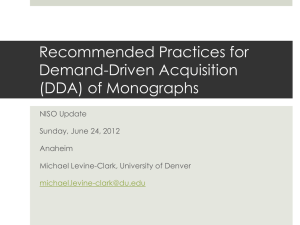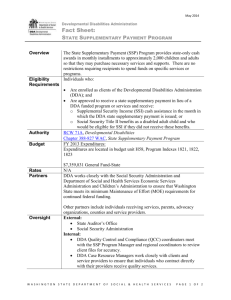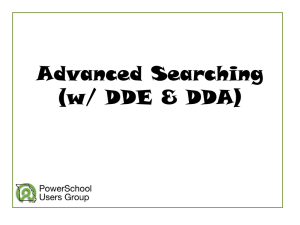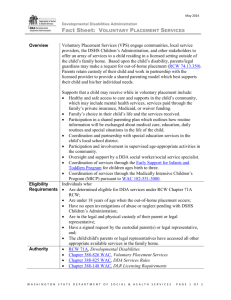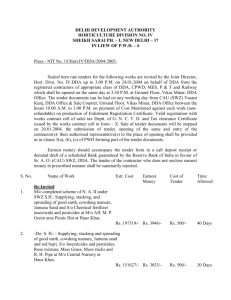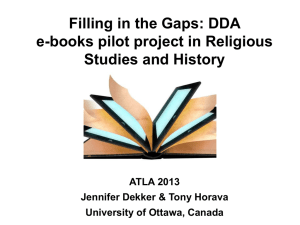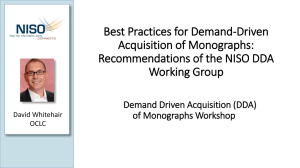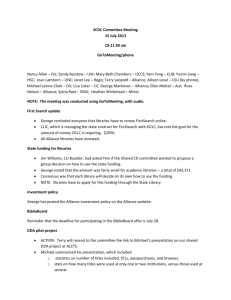- Memorial University Research Repository
advertisement
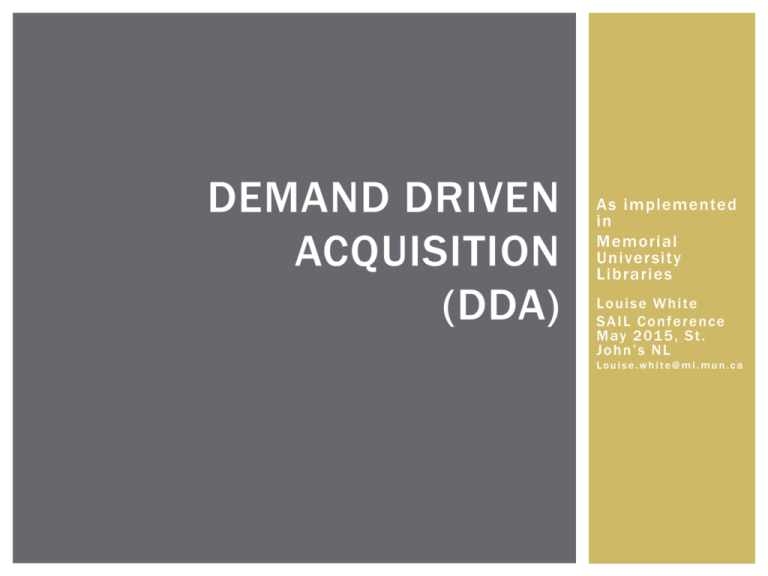
DEMAND DRIVEN ACQUISITION (DDA) As implemented in Memorial Univer sity Libraries L o u i s e W h i te SAIL Conference M ay 2 01 5 , S t . John’s NL Louise.white@mi.mun.ca THE PROBLEM Library Strategic Plan developed around three “frameworks”: Teaching & Learning; Research ; and Public Engagement Under Research, Library identified need for faster access to more scholarly monographs Speed was the object If “fast” is good, “immediate” must be better Other watch words included “efficient” and “effective” Naturally, this had to be accomplished within the current budget allocation THE SOLUTION A DDA program seemed the most ef ficient and ef fective way to provide immediate access to more ebooks DDA provides users with immediate access to a wide range of titles to be purchased at point of need MARC records for titles not owned are added to the catalogue A financial transaction occurs only when an un -owned title is accessed Not quite as simple as it sounds, but still worth the ef fort SETTING THE PARAMETERS Memorial was already purchasing ebooks from aggregators EBSCO, Ebrary and EBL as well as directly from publishers YBP, our primary monograph vendor, of fered a consolidated approach to all three aggregators which could be integrated with current collections profiles & practice Decided to proceed with pilot project using YBP with EBSCO as principle aggregator and Ebrary and EBL as supplementary Also decided To start with a Forward file and then add Retrospective coverage Three short term loans would trigger a purchase BUILDING THE CONSIDERATION POOL Memorial makes very little use of approval plans Instead, we have slip plans which have associated profiles by discipline Records for items which match each profile are available to collectors for selection and ordering via Gobi DDA profile is essentially a consolidation of those profiles with exceptions Exceptions can be by series (e.g.. For Dummies) or by publisher (e.g. ) DDA profile also limited to those ebook titles which are DDA enabled DISCOVERY MARC records for consideration pool titles are supplied by YBP Cataloguing & Metadata evaluated records for conformity to standard, added unique identifier Loaded on a weekly basis to both classic catalogue and discovery layer Summon As of May 5, 2014 there are over 28,000 items in Memorial’s consideration pool That items are un-owned is not transparent to users NEW FRONTIER IN ACQUISITIONS Takeaway Alert: DDA changes the acquisitions process from a series of one of f transactions to long -term management of the consideration pool MANAGING THE POOL Set up acquisition rules with three vendors Receive and load Marc records weekly Records enhanced with unique identifier to aid removal Receive STL notices then invoices; add to orders to Workflows Vigilance required to avoid double, triple billing When three orders placed, shadow title in catalogue and purchase title DDA titles increase % of collection which is e and therefore susceptible to access problems INFLUENCE ON COLLECTIONS PRACTICE A portion of the monograph budget was allocated to DDA at the beginning of the FY All Branch Libraries contributed to the DDA account Collections librarians can see that a title in their subject profile is DDA enabled in Gobi Several report allowing a title being considered for purchase to be exposed via DDA, purchase to follow only if demand is illustrated Collections librarians looking at unique titles as indicator of new areas of demand as well as measure of acceptance of ebook format by discipline IMPACT ON PUBLIC SERVICE All issues experienced with ebooks generally experienced by DDA titles Limited DRM, access interruptions, single vs multiuser access to support e-reserves We were concerned that mediated purchase, which introduces a break in access, would be a problem. No issue documented so far. We speculate that DDA will decrease monograph borrowing via document delivery. As pattern of decline already established, may be dif ficult to document cause and ef fect. STL - ASSESSMENT A total of 1 ,329 STLs occurred. Most between January – March 2014 Highest STL counts were in Biology (164), Health (117) and Business (89) 1 ,091 unique titles were accessed (4% of titles in program) 81% had 1 STL 14% had 2 STLs 4% had 3 STL Total expense was $26,946 Average cost per STL was $20.28 Average cost per unique title was $24.70 PURCHASES - ASSESSMENT A total of 48 purchases occurred. Most between January – March 2014 Total expenditure on purchases was $6,662.97 Average cost per purchase was $138.81 Highest number of purchases were in the subject areas of English (8), Business (4) and Psychology (4) FINDINGS (TO DATE) DDA Committee would recommend that the pilot continue Really have only one term of full implementation Early data shows a positive value proposition Provided access to 1 ,091 unique titles at an average cost of $24.70 Acquisitions processes implemented for the pilot have proven ef fective, if time consuming, and should continue No opportunity to discuss DDA programs with publishers, aggregators, or vendors should be missed (Charleston conference, NISO Draft recommendations…) QUESTIONS?
